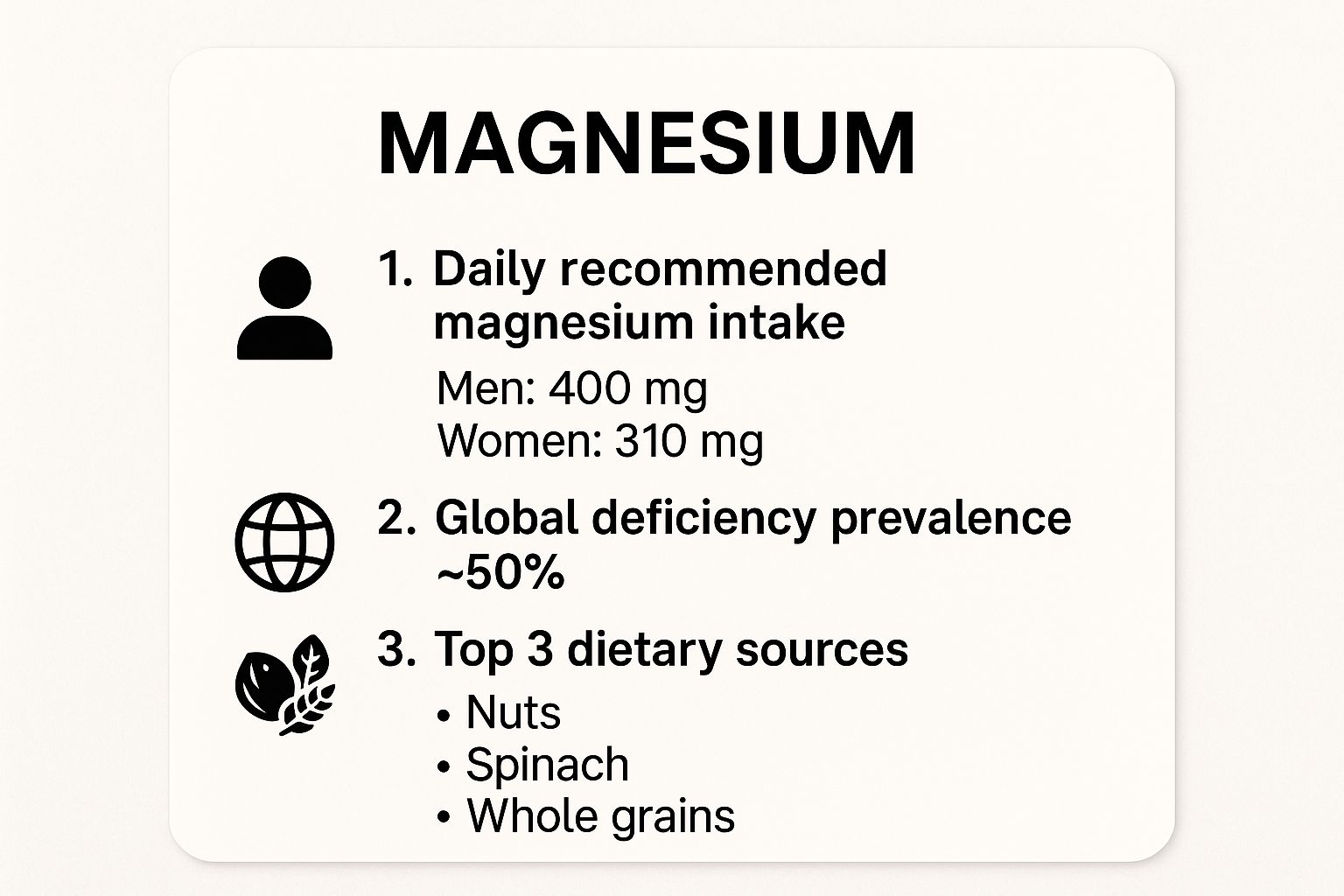
Best Time to Take Magnesium: Maximize Your Benefits
Share
So, you’ve decided to add a magnesium supplement to your daily routine. That’s a great first step toward better health. But did you know that when you take it can make all the difference? The best time to take magnesium really comes down to what you’re hoping to achieve.
If you’re looking for deeper, more restorative sleep, taking it one to two hours before bed is your best bet. On the other hand, if your goal is more energy for your day or better support for your workouts, a morning or pre-workout dose often works wonders.
Your Guide to Magnesium Timing
Magnesium is one of the hardest-working minerals in your body, involved in over 300 different essential functions, from producing energy to keeping your nervous system calm. But just popping a supplement whenever you remember isn't the most effective strategy. To really get the most out of it, you need to align your intake with your body’s natural rhythms and your personal health goals.
Think of it like this: you wouldn’t have a strong coffee right before trying to sleep. In the same way, matching your magnesium timing to your desired outcome helps unlock its full potential. Whether you're trying to quiet a busy mind for a restful night or fuel your muscles for a tough session at the gym, the moment you take your magnesium truly matters.
Why Timing is Everything
Let’s take a look at a few key facts to see why smart supplementation can be so helpful.

As you can see, many of us aren't hitting our daily magnesium targets through diet alone. This makes a well-timed supplement a really practical way to bridge that gap and support your specific health goals.
The most crucial takeaway is that strategic timing isn't just a minor tweak—it's a fundamental part of making your magnesium supplement work effectively for your specific needs, whether that's for sleep, energy, or muscle recovery.
Magnesium Timing Based on Your Health Goals
To make it even clearer, here’s a quick-reference table to help you decide on the best timing for your primary objective.
| Primary Goal | Recommended Timing | Reasoning |
|---|---|---|
| Improved Sleep Quality | 1-2 hours before bed | Magnesium helps calm the nervous system and supports melatonin production, promoting relaxation and deeper sleep. |
| Increased Energy & Mood | With breakfast or lunch | It plays a key role in energy production at a cellular level, helping to combat fatigue throughout the day. |
| Enhanced Exercise Performance | 30-60 minutes pre-workout | Magnesium aids in muscle function, energy metabolism, and electrolyte balance, which can improve endurance. |
| Muscle Recovery & Cramp Prevention | Post-workout or before bed | It helps muscles relax, reduces soreness, and replenishes levels that may have been depleted during exercise. |
| General Health & Well-being | With any meal | Taking it with food can improve absorption and reduce the chance of an upset stomach. Consistency is key here. |
Ultimately, whether you take it in the morning to kickstart your day or at night to unwind, being consistent is what will deliver the best results.
Why Supplement Timing Unlocks Magnesium's Full Potential
Think of your body as a high-performance engine. It needs different fuels and maintenance at specific times to run smoothly. Magnesium is a vital part of that system, acting like a spark plug for over 300 essential biochemical reactions—everything from producing energy to relaxing your nervous system.
You wouldn't fill a car with petrol while it's mid-race, right? In the same way, timing your magnesium intake helps it work in harmony with your body’s natural daily cycles. It’s not just about what you take, but when you take it.
This is especially true here in the United Kingdom, where about 50% of adults regularly use supplements to support their health. By coordinating your dosage with your biological clock, you ensure the mineral is available precisely when your body needs it most. That might be for a burst of energy in the morning or to help calm your mind at night. A Food Standards Agency survey on supplement use highlights just how common this practice is.

Aligning With Your Body’s Rhythms
Your body runs on an internal 24-hour clock, known as the circadian rhythm. This rhythm influences pretty much everything, from your sleep-wake patterns to your hormone release.
When you align your magnesium intake with these natural rhythms, you aren't just supplementing; you are strategically supporting your body's built-in processes. This simple adjustment can turn a good supplement into a great one.
Here’s a practical example: taking magnesium in the evening can support the body’s natural wind-down process. It helps regulate neurotransmitters that promote calmness and sleep, making it a perfect pre-bedtime companion.
On the flip side, a morning dose can aid in the cellular energy production needed to kickstart your day. This isn't just about absorption—it’s about providing the right tool at exactly the right time. By understanding this, you move from just passively taking a pill to actively optimising your health and getting the results you’re paying for.
Timing Magnesium for Deeper Sleep and Relaxation
For the millions of us in the UK tossing and turning at night, finding a natural way to properly unwind can feel like a constant battle. This is where magnesium really comes into its own, acting as your body's personal relaxation mineral. The best time to take magnesium for sleep is usually about one to two hours before you plan on hitting the pillow. This gives it plenty of time to get to work.

Think of this evening routine as a way of gently preparing your body and mind for a restorative night. If your brain is like a bustling city, magnesium helps to quieten the traffic and dim the lights. It does this by binding to and stimulating your gamma-aminobutyric acid (GABA) receptors—neurotransmitters that are brilliant at calming down nerve activity.
This calming effect is absolutely essential for shifting into a state of rest. On top of that, magnesium plays a key part in regulating melatonin, the hormone that dictates your sleep-wake cycles. Having the right amount of magnesium helps your body produce enough melatonin at the right time, signalling that it’s time to wind down.
Choosing the Best Magnesium for Sleep
When it comes to sleep, not all magnesium is created equal. Some forms are far better suited for relaxation because they’re more easily absorbed by your body and are gentler on the stomach.
- Magnesium Glycinate: This is often seen as the gold standard for sleep. It’s bound to glycine, an amino acid that has calming properties of its own. This makes for a powerful duo that promotes relaxation without the risk of an upset stomach.
- Magnesium Citrate: While it's also effective for sleep, it can have a mild laxative effect. This might be a good option if you’re also looking to support your digestive regularity.
Bringing a high-quality sleep formula into your routine can offer a blend of ingredients that work together to boost these effects. Our Vitzai Sleep Formula, for instance, is specifically designed to support a truly restful night.
By taking a calming form of magnesium before bed, you’re not just popping a supplement; you're actively supporting your body's natural sleep processes. It's a simple step that can help you fall asleep faster and improve the overall quality of your rest.
This nightly ritual is widely supported by health practitioners. In the UK, nutritional guidance often points to taking magnesium before bedtime to encourage muscle relaxation and better sleep. This recommendation is firmly backed by what we know about its role in regulating the nervous system. You can learn more about the growing UK market for vitamins and minerals on Statista.
How to Time Magnesium for Peak Exercise Performance
If you lead an active life, think of magnesium as the unsung hero on your muscles' support team. When you exercise, your body tears through this vital mineral at a much quicker rate to produce energy, keep electrolytes in check, and support muscle contractions. This ramped-up demand means that getting your timing right isn't just a nice-to-have—it's essential for both your performance and recovery.
The big question for athletes and gym-goers is whether to take magnesium before or after a workout. The truth is, both have their own distinct advantages, and the best choice really boils down to your fitness goals and how your body feels.
Pre-Workout for Fuel and Function
Taking magnesium about 30 to 60 minutes before you exercise can prime your body for the effort ahead. It plays a massive part in energy metabolism, helping to convert glucose into fuel your muscles can actually use.
It also helps shuttle electrolytes like potassium and calcium across cell membranes, a process that’s absolutely vital for nerve signals and fending off those pesky muscle cramps mid-session. It's a bit like topping up your engine oil before a long drive to make sure everything runs smoothly.
Post-Workout for Repair and Relaxation
On the flip side, taking magnesium after your workout is all about recovery. Exercise creates tiny tears in your muscle fibres, and magnesium is a key player in the protein synthesis needed to repair and rebuild them stronger than before.
Its most famous benefit, of course, is muscle relaxation. A post-workout dose can help ease muscle tightness and reduce the dreaded delayed onset muscle soreness (DOMS), helping you recover faster so you can get back to your routine with less downtime.
The reality is, a lot of people in the UK might not be getting enough magnesium in the first place, which makes timing even more critical if you're active. For instance, figures from the National Diet and Nutrition Survey show that around 19% of young adults in their 20s have magnesium intakes below recommended levels. Since athletes have even higher needs, smart timing ensures you’re topping up this mineral right when your body is crying out for it. You can find more insights in the UK nutrition survey on PMC.
Ultimately, the best approach is to experiment a little. Try taking it pre-workout for a week and pay attention to how your performance feels. Then, switch to post-workout and see how your recovery changes. This hands-on approach will help you nail down the perfect timing to support your fitness journey.
Getting The Most Out of Your Magnesium Supplement

Simply taking a magnesium supplement is only half the story. The real trick is making sure your body can actually absorb and put it to good use. One of the simplest ways to do this is by taking your supplement with a meal. This little step can make a huge difference in absorption and also helps sidestep the digestive grumbles some people get on an empty stomach.
But it’s not just about timing your meals. You also need to think about what other supplements might be in the mix.
Picture your digestive system as a busy motorway with only a few entry ramps for nutrients. Certain minerals, like high doses of zinc and calcium, need to use the same ramps as magnesium. If you take them all at the same time, they end up in a traffic jam, competing for absorption. Inevitably, some will get left behind.
To get the most from every dose, it's wise to space out your supplements. If you take a high-dose zinc or calcium supplement, consider taking it at a different meal than your magnesium.
Smart Supplement Pairing
Creating a smart routine is all about knowing what helps and what hinders. Vitamin D, for example, is a fantastic partner for magnesium. It helps regulate the body's mineral balance and is essential for getting magnesium where it needs to go. In fact, many people find that a good Vitamin D3 supplement can make their magnesium work even more effectively.
So, how can you build a routine that makes your efforts count? It's easier than it sounds. The key is to be mindful of a few simple interactions.
Here's a quick reference table to help you pair your supplements and food for the best results.
Maximising Magnesium Absorption Dos and Don'ts
| Interaction Type | Examples | Recommendation |
|---|---|---|
| Helpers | Vitamin D, Protein-rich foods (e.g., chicken, nuts) | Take magnesium with a balanced meal that includes protein. Consider supplementing with Vitamin D. |
| Blockers | High-dose zinc or calcium supplements, phytic acid (in raw nuts & grains) | Stagger competing mineral supplements by at least two hours. Soak or cook foods high in phytic acid. |
By paying attention to these simple details, you can be confident your body is fully utilising this vital mineral, rather than letting it go to waste.
Choosing the Right Type of Magnesium for Your Goal
Wandering down the supplement aisle can feel pretty overwhelming, right? But figuring out that not all magnesium is created equal is a great first step. Getting the timing right is one thing, but it’s only going to work if you’re using the form of magnesium that actually matches your health goals.
Think of it like picking the right tool for a job. You wouldn't use a hammer to turn a screw, and the same logic applies here. The type of magnesium you choose should link directly to what you're trying to achieve, whether that's deeper sleep, more energy, or better digestion.
Matching the Form to Your Function
Different forms of magnesium are bound to other molecules, and this completely changes how they’re absorbed and what they do in your body. It's why some types are fantastic for calming your mind, while others are better suited for tired muscles.
Here’s a quick rundown of the most common types to help you decide:
- Magnesium Glycinate: This is the top choice if you're looking for better relaxation and deeper sleep. It's bound to the calming amino acid glycine, making it super easy for your body to absorb and really gentle on the stomach. You can check out a high-quality magnesium glycinate supplement designed for maximum absorption.
- Magnesium Citrate: Known for being easily absorbed, this form is a go-to for supporting digestive regularity. It has a natural, gentle laxative effect that can help get things moving.
- Magnesium Malate: Often recommended for anyone dealing with muscle fatigue and soreness. That's because malic acid plays a key part in your body's energy production cycles.
By zeroing in on your main goal first, you can confidently pick the most effective supplement for the job and make sure it’s working as hard as you are.
Got More Questions About Magnesium?
Let's clear up some of the common questions that pop up when you're trying to get your magnesium routine just right. We’ve got the straightforward answers to help you feel confident about your choices.
Is It Okay to Take Magnesium Every Day?
Yes, absolutely. For most people, taking magnesium daily is not only safe but often beneficial, especially if your diet isn't quite hitting the mark on this essential mineral.
The golden rule is to stick to the recommended dosage on the product label unless your doctor or a qualified health professional has told you otherwise. Consistency is what really makes the difference, so making it a daily habit is the best way to see results.
How Do I Know If I Need More Magnesium?
Your body has a few ways of telling you it might be running low. Common signs include nagging muscle cramps or twitches, feeling tired all the time, not sleeping well, or even feeling more stressed than usual.
However, these symptoms can be a bit vague and point to other issues too. The best move is always to chat with your doctor for a proper diagnosis before you start taking any new supplement.
Remember, the ideal timing really hinges on what you're trying to achieve. Taking magnesium at night is brilliant for relaxation and sleep. A morning dose, on the other hand, can support your energy levels and muscle function throughout the day. A simple tweak like this helps you get the most out of every serving.
Ready to build a smarter supplement routine that’s perfectly tuned to you? The tools at VitzAi.com can help you discover the vitamins and minerals that fit your unique health goals. Find your personalised recommendations today at https://vitzai.com.
This article is for informational purposes only and is not medical advice. Always consult a qualified health professional before starting any new supplement or major lifestyle change.
